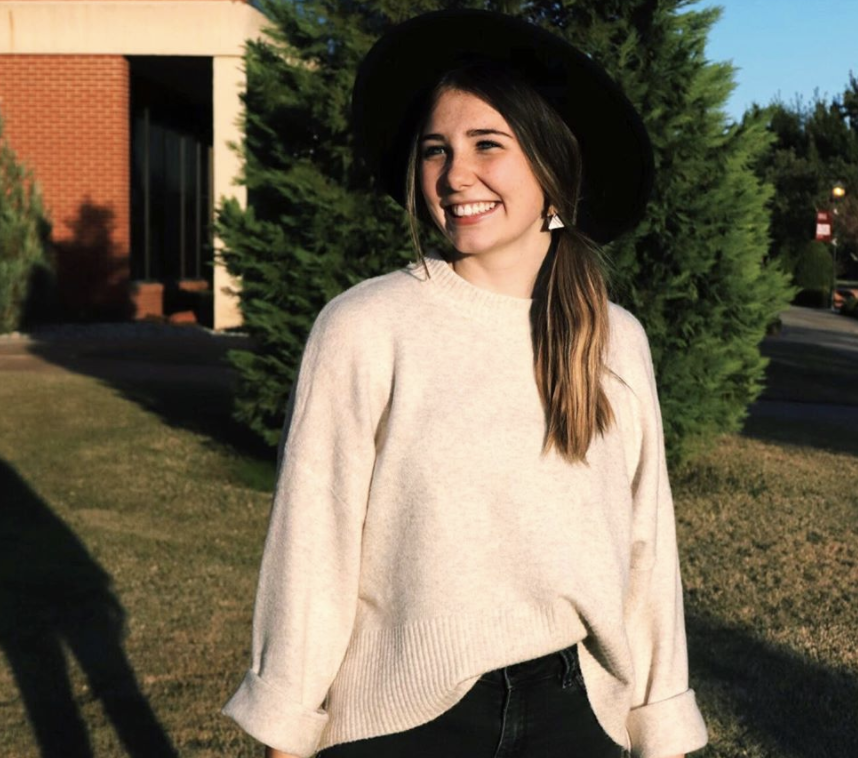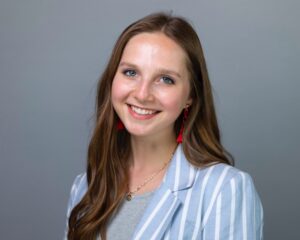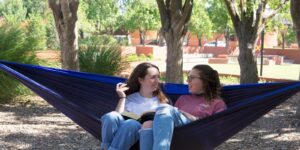By Kelly Webber
Growing up, Ell Davis grew up in foster care and moved back and forth between California. She is now a junior at Oklahoma Christian University, majoring in public communication and leadership while double minoring in Bible and marketing. She is not certain about what she wants to do post-college but possibly wants to work for a nonprofit. Davis an active member of Gamma Rho. She works as a barista in the Brew, and she has also started her own small business. The Brew helps her socialize and be involved with people on campus. It is also a job which teaches her skills for her life, but most importantly it keeps her present in people’s lives.
Davis and her friend Brittany Dubose design, make and sell baked clay earrings. Davis is a creative person, and she wanted to create products for college students who want to keep up with trends while staying affordable. She is paying her way through college, and this also helps her earn money. Davis likes the idea of continuing her business throughout and after college so it grows over time.
Davis also works with the Department of Human Services in child welfare. She started this year, and she helps teenagers who are a part of the foster care system transition into adulthood. At DHS, Davis is able to have the opportunity to help them financially and prepare them for college and the workforce.
Q. What was your experience in foster care like?
A. “I was in the foster care system for 16 years. I did what you called aging out, which is when you turn 18. It was interesting growing up in the system, because it’s all I ever knew. Even though I did not experience a family, it’s always something I longed for even though I didn’t know what that was like. A lot of people look at the foster care system and think it’s broken and terrible, but there are a lot of homes that are amazing that help children in every way they can. In school, I was sometimes embarrassed just because people can be so mean and a lot of times children don’t understand. I was in 11 homes and was almost put in a shelter, but the family who took me in the weekend before let me stay.”
Q. How has being in the system affected your childhood/young adult life?
A. “I think that a lot of people don’t realize there’s trauma because of the actual reason you are in foster care. There are big traumas like abandonment or being exposed to drugs, but then there are smaller traumas like being in a family that you know is not yours. There are subconscious desires to be a part of those families even though you won’t be. There were feelings of not being enough or being worthy of those families. I was there physically, but I didn’t belong.”
Q. What is something important about your experience that more people should know?
A. “More people should know that it is okay for people to come from something different than you. People are uncertain about things like foster care, and I think that is why people were so mean to me when they found out I was in foster care when I was younger because they did not know. People shouldn’t shy away from questions about what they don’t know. Ask the questions and learn more.”
Q. How did you feel when you were adopted by your family?
A. “I was not adopted until I was 19. It’s called an adult adoption, and it is more of a formality. It helps not only feel like I am a part of a family and I get to live with them, but it also helps with things like having the same last name as someone and being able to depend on them.”
Q. How has being a part of the system affected your ideas about starting your own family?
A. “I feel like it has definitely given me an idea of what I do not want in a family. A lot of people fall into the habit of raising their family how they were raised. It makes me question, ‘What are the unhealthy habits?’ One thing I will never do is ever tempt myself with anything that is based in addiction. It has messed with my family, and I’ve seen them fall to temptation. Also, growing up in the system gives you an idea of so many different types of families, both healthy and unhealthy. It’s almost like I can pick and choose from the best ways to raise a family. I don’t really think I want to foster or adopt within the country, but I do feel like I’m called to adopt hopefully internationally. I might end up fostering, but initially in my young adulthood that’s not something I would do.”
Q. What advice would you give to your young self or someone going through what you went through?
A. “I would just say something really cliche like family isn’t biological. It’s whoever loves you and who you love, as well as who you choose to surround yourself with. So choosing people who love you for you and who don’t just say it but show it.”
Q. Favorite animal?
A. Dog.
Q. Dream vacation spot?
A. Italy.
Q. Go-to comfort food?
A. Mac and cheese.
Q. Favorite color?
A. White.
Q. Worst movie you’ve ever seen?
A. “Rubber.”
Q. If you had to change your name what would you change it to?
A. Probably just Lashell to Ell officially.
This article was completed as part of an Oklahoma Christian journalism course. It was edited and approved by Talon editors.













Be First to Comment